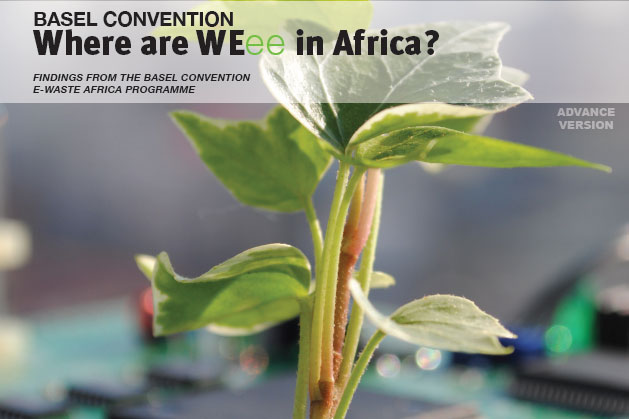 |
| Download |
| English: |
 |
French: |
 |
Where are WEEE in Africa? Findings from the Basel Convention E-waste Africa Programme
 Information Communication Technology (ICT) has revolutionized modern living, international business, global governance, communication, entertainment, transport, education, and health care. This has been driven by unprecedented high volumes of production and usage of consumer electronic products, in particular, personal computers, mobile phones, and television sets. Access to ICT has been identified as an indicator of a country’s economic and social development. The difference in access to ICT between developed and developing countries is commonly referred to as the “digital divide”. Africa has been undergoing rapid ICT transformation in recent years, attempting to bridge this divide by importing second-hand or used computers, mobile phones, and TV sets from developed countries. The countries of the region, however, lack the infrastructure and resources for the environmentally sound management (ESM) of electrical and electronic waste (e-waste) arising when such imports reach their end-of-life.
| Download |
| English: |
 |
French: |
 |
|
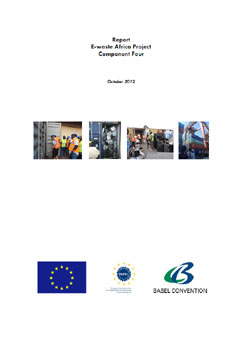 |
| Download |
| English: |
 |
Report E-waste Africa Project Component Four
 The E-waste Africa Project is a comprehensive programme aiming at enhancing the environmental governance of e-wastes and at creating favorable social and economic conditions for partnerships and small businesses in the recycling sector in Africa. It has been implemented in the framework of the Basel Convention on the Control of Transboundary Movements of Hazardous Wastes and their Disposal. The project ran from November 2008 to June 2012.
The project was implemented by the Basel Convention Coordinating Centre based in Nigeria (BCCC-Nigeria) and the Basel Convention Regional Centres based in Egypt (BCRC-Egypt) and Senegal (BCRC-Senegal), in cooperation with partners including the Swiss Federal Laboratories for Materials Science and Technology (EMPA), the Institute for Applied Ecology (the Okö-Institute), the European Union Network for the Implementation and Enforcement of Environmental Law (IMPEL), the United Nations Educational, Scientific and Cultural Organization (UNESCO), and the Partnership for Action on Computing Equipment (PACE). The Secretariat of the Basel Convention (SBC) is responsible for the overall project coordination.
| Download |
| English: |
 |
|
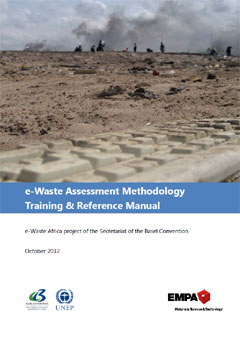 |
| Download |
| French: |
 |
e-Waste Assessment Methodology Training & Reference Manual
Access to Information Communication Technology (ICT) is pivotal of a country’s economic and social devel-opment and is currently improving throughout the developed and developing world. ICT is also contributing to the ever growing amount of e-waste, when appliances reach their end of life. E-waste has been acknowl-edged as a complex waste stream containing both hazardous substances and valuable secondary resources. Serious health, socio-economic, and environmental problems that arise due to the unsound management of e-waste have been widely documented. While especially in OECD countries the paradigms of the "closed loop economy" and the "extended producer responsibility (EPR)" lead to a professionalized e-waste recycling sector, developing countries and countries in transition often lack the infrastructure and resources for the sustainable management of e-waste.
| Download |
| French: |
 |
|
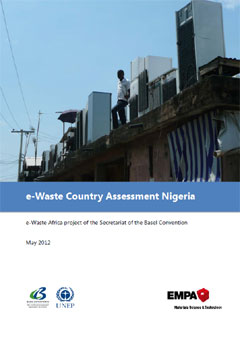 |
| Download |
| English: |
 |
e-Waste Country Assessment Nigeria
 Access to Information & Communication Technology (ICT) is pivotal of a country’s economic and social development and is currently improving throughout the developed and developing world. Still there is a relevant difference in access to ICT between developed and developing countries, which is commonly referred to as the "digital divide". Nigeria has been undergoing rapid ICT trans-formation in recent years, attempting to bridge this divide by importing new, second-hand or used computers, mobile phones, and TV sets from developed countries. These appliances together with other electrical and electronic equipment (EEE) are also contributing to the ever growing amount of waste electrical and electronic equipment (WEEE) or e-waste for short, when they reach their end of life.
This report presents a national e-waste assessment for Nigeria and investigates the situation with regard to e-waste looking into, inter alia, trends of EEE imports, use and e-waste generation. The Nigerian study is part of the e-waste Africa project of the Secretariat of the Basel Convention, with the overarching goal to enhance the capacity of West Africa and other African countries to tackle the growing problem of e-waste and thereby protect the health of citizens, particularly children, while providing economic opportunities.
| Download |
| English: |
 |
|
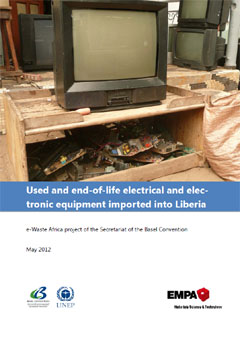 |
| Download |
| English: |
 |
Used and end-of-life electrical and electronic equipment imported into Liberia
 Obsolete electrical and electronic equipment (EEE) produced worldwide and specifically in African countries, together with the absence of well-organized collection and management systems has manifold impacts on the environment, the health of local communities and the economic system. This report presents a qualitative and - to some extent - a quantitative assessment of the situation of the import of used and end-of-life elec-trical and electronic equipment imported into Liberia.
14 Years of conflict and mismanagement during the civil war period have resulted in a public services infra-structure that is greatly lacking in capacity, extending from physical infrastructure such as electricity and wa-ter supply, to political infrastructure such as legislation and enforcement thereof. The lack of a formal chemi-cals and waste management regime in Liberia has created and exacerbated many of the environmental prob-lems that the country currently faces in reaching its goals for sustainable development. Overall, Liberia has limited financial resources and a lack of technical expertise at the national level necessary to develop and implement waste management (e.g. e-waste) programs that would support monitoring (law enforcement and human/environmental health), dissemination of and access to available information as well as opportunities for training and education in this area. As a result Liberia has no specific legal instruments relating to e-waste management. However, policies and legislation relating to waste management in general do exist, as well as a broad national legal and institutional framework for the development, adoption and enforcement of such measures. Examples are the act creating the Environmental Protection Agency (EPA), the National Environ-mental Policy and specifically Part IV of the Environmental Protection and Management Law, which provides for the establishment of standards by the EPA, including water and air quality, toxic chemicals and pesticides (including POPs), hazardous wastes and materials, as well as waste management.
New and used EEE is imported into Liberia from Europe (mainly from Italy, Belgium and Germany), North America (mainly USA) and some African countries (mainly used EEE from Nigeria, Egypt and Guinea). Some are whole and some are parts to be assembled. New EEE with original or faked brands is also imported from Asia (mainly Hong Kong, China, India, Japan, Korea) and from the Middle East (mainly from Dubai and Leba-non). From the limited statistical data, which was available, it was estimated that Liberia received around 3’500 tonnes of EEE imports in 2009. According to the interviews with customs and port authorities approx. 10% of this volume is used EEE. About 70% of used EEE imports arrive in a functioning state, but life span is often very short. Around 15% need to be serviced or repaired, while about 15% are not functioning and can-not be repaired. Approx. 90% of imports are new products, however often having a low life expectancy just like second-hand products. Observations point to the suspicion that many new imports are non or faked branded low cost Asian imports. The average household in Liberia possess around 25 kg of EEE, which is ap-proximately 4.6 kg per capita. Extrapolating this numbers to the whole country results in an upper limit of around 170,000 tonnes of EEE installed in Liberian households.
The result of this study is a preliminary description of the national landscape related to the imports and us-age of EEE in Liberia. It is suggested that Liberia proceeds with its effort to assess the e-waste situation in the country in some more details. In parallel and by including the key stakeholders, a national e-waste manage-ment strategy should be developed under the coordination of the EPA. In a first phase a focus should be set on policy and legislation issues as well as capacity and awareness building measures at all levels.
| Download |
| English: |
 |
|
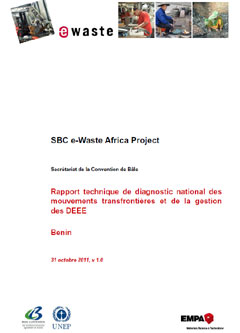 |
| Download |
| French: |
 |
Rapport technique de diagnostic national des mouvements transfrontières et de la gestion des DEEE - Benin
 The population and the companies of Benin, just like the rest of the world, enjoy the benefits of using electrical and electronic equipment which contributes to the economic development of the country. The ever increasing amounts of EEE imported into the country – for large share second-hand equipments - pose significant social, economic and environmental problems when they reach their end-of-life. Dominated by the informal
sector, the recycling of WEEE generates significant social and environmental impacts.
The Benin e-Waste Country Assessment, comprising Components 1 and 2 of the Secretariat of the Basel Convention e-Waste Africa Project, was undertaken between November 2009 and May 2011, with a main focus on the Cotonou area and on various entry points of used EEE and WEEE into the country.
The study’s focus areas includes an analysis of the policy and legal frameworks; an analysis of all stakeholders including importers and distributers, consumers, collectors, repairers, dismantlers, and recyclers of EEE and the disposal mechanisms available at present; a mass flow assessment; an evaluation of social and environmental impacts; and the drafting of a national WEEE management strategy. All four categories of EEE, namely 'large household appliances', 'small household appliances', information and communication technologies' and 'consumer electronics' are included in the study. Sources of data include surveys, field investigations, national statistics, stakeholder interviews, the UN Comtrade database, etc.
| Download |
| French: |
 |
|
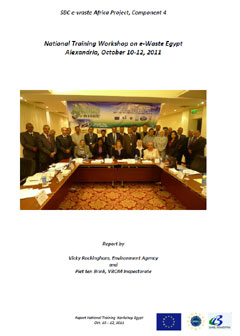 |
| Download |
| English: |
 |
National training workshop on e-waste in Alexandria, Egypt, 10-12 October 2011
The fourth African national training workshop of the SBC e‐waste Africa Project (Component 4) was held on 10‐12 October in Alexandria, Egypt.
| Download |
| English: |
 |
|
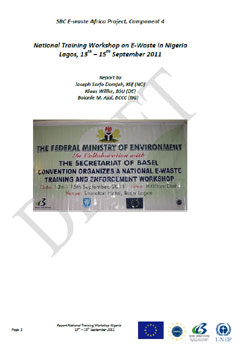 |
| Download |
| English: |
 |
National training workshop on e-waste in Lagos, Nigeria, 13-15 September 2011
The third African national training workshop of the SBC e-waste Africa Project (Component 4) was held on 13th – 15th September in Lagos, Nigeria.
| Download |
| English: |
 |
|
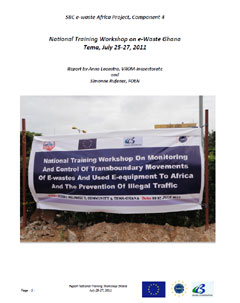 |
| Download |
| English: |
 |
National training workshop on e-waste in Tema, Ghana, 25-27 July 2011
The first African national training workshop of the SBC e‐waste Africa Project (Component 4) was held on July 25th to 27th in Tema, Ghana. The workshop was mainly organised by Environment Protection Agency (EPA) Ghana in collaboration with Ghana Ports and Harbours Authorities (GPHA), Ghana Customs, Excise and Preventive Service (CEPS) and the Ports Environmental Network Africa (PENAF).
| Download |
| English: |
 |
|
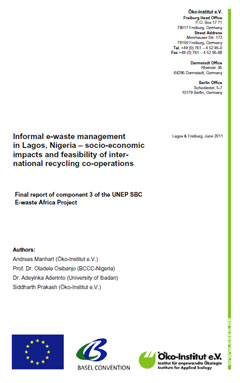 |
| Download |
| English: |
 |
Informal e-waste management in Lagos, Nigeria – socio-economic impacts and feasibility of international recycling co-operations
 Lagos is the one of the world’s largest cities and the economic centre of Nigeria. With its 17.5 million inhabitants and considerable economic growth rates in the last years, the local consumption of electrical and electronic equipment (EEE) reached high levels in absolute figures. While this growth is desirable from a development perspective and in particular regarding living standard and access to Information and Communication Technologies (ICTs), it also raises the question on sound end-of-life solutions which are not yet in place in the country.
In addition to the local consumption, Logos has developed into West Africa’s main entry point for used and end-of-life electrical and electronic equipment. Although this equipment is mostly refurbished and sold to households and traders from Nigeria and other West and Central African countries, this sector generates significant amounts of e-waste, a problem that was first brought to public attention in 2005 with the film “The digital dump” by the NGO Basel Action Network (BAN).
In the course of the debate, the European Commission, the Governments of Norway and the United Kingdom, and the Dutch Association for the Disposal of Metal and Electrical Products (NVMP) financed the E-waste Africa Project, which is managed by the Secretariat of the Basel Convention (SBC). The project is a comprehensive programme of activities aiming at enhancing environmental governance of e-wastes and at creating favourable social and economic conditions for partnerships and small businesses in the recycling sector in Africa.
This study is integral part of the E-waste Africa Project and contains an in-depth socioeconomic study on the functioning and the sustainability impacts of the informal EEErefurbishing and e-waste recycling sector in Lagos, as well as a comparison of currently practiced and best available recycling technologies. By combining these types of analysis, the report derives “best applicable technologies” regarded suitable for the implementation in the Nigerian context. In addition, the report formulates recommendations to policy-makers, the Nigerian recycling industry and for pilot follow-up activities.
| Download |
| English: |
 |
|
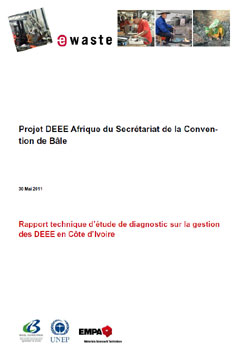 |
| Download |
| French: |
 |
Rapport technique d’étude de diagnostic sur la gestion des DEEE en Côte d’Ivoire
 The population and the companies of Côte d’Ivoire, just like the rest of the world, enjoy the benefits from using the electrical and electronic equipment which contributes to the economic development of the country. The ever increasing amounts of EEE imported into the country pose significant social, economic and environmental problems when they reach their end-of-life. Dominated by the informal sector, the recycling of WEEE generates significant social and environmental impacts.
The Côte d’Ivoire e-Waste Country Assessment, comprising Components 1 and 2 of the Secretariat of the Basel Convention e-Waste Africa Project, was undertaken in the Abidjan and San Pedro areas between November 2009 and December 2010.
The study’s focus areas includes an analysis of the policy and legal frameworks; an analysis of all stakeholders including importers and distributers, consumers, collectors, repairers, dismantlers, and recyclers of EEE and the disposal mechanisms available at present; a mass flow assessment; an evaluation of social and environmental impacts; and the drafting of a national WEEE management strategy. All four categories of EEE, namely 'large household appliances', 'small household appliances', information and communication technologies' and 'consumer electronics' are included in the study. Sources of data include surveys, national statistics, stakeholder interview, the UN Comtrade database, etc.
| Download |
| French: |
 |
|
 |
| Download |
| French: |
 |
Ghana e-Waste Country Assessment
 The emergence of the digital age has underscored the important role that EEE plays in a nation’s socioeconomicdevelopment, including education, health delivery and communications as well as global connectivity.In 2003 Ghana formulated its policy on Information and Communications Technology (ICT) for accelerateddevelopment, with the understanding for instance, that Ghana’s accelerated development would notbe possible without an ICT-driven development agenda. The demand for EEE in Ghana grows by the daywith a corresponding high rate of WEEE generation. Almost all EEE in Ghana is imported mainly from Europe,North America and Asia.
The Ghana e-Waste Country Assessment, comprising Component 1 and 2 of the Secretariat of the BaselConvention e-Waste Africa Project, was undertaken in the Accra – Tema area of Ghana between November2009 and January 2011. The study subjects included; importers and distributers, assemblers, consumers, collectors,repairers, dismantlers, and recyclers of EEE and the disposal mechanisms available at present. AllEEE of the four categories 'large household appliances', 'small household appliances', information and communicationtechnologies' and 'consumer electronics' were included in the study. The findings were then extrapolatedto become representative of Ghana as a whole. Sources of data included surveys, CEPS, UN Comtrade,and Statistical Service etc.
The EEE imports into Ghana in 2009 added up to 215'000 tons and a per capita import of 9kg. About 30%comprised of new products and 70% second hand EEE. Around 15% of the second hand imports was estimatedto be unsellable (i.e. would not respond to power, broken or outdated), a significant portion of whichwas destined directly to informal recycling. Another 20% of the imports can be serviced (repaired/refurbished) to get them functioning. Due to high amounts of second hand imports, Ghana has a highavailability of second hand EEE that can be purchased at comparatively low prices. This makes these productsavailable for a larger share of the population, compared to other countries, and gives many Ghanaiansthe possibility to benefit from EEE in their everyday life. On the other hand, second hand products have ashorter lifespan compared to new products, which leads to a higher e-waste generation per year. The equipmentthat arrives already in broken condition is added to the internally generated WEEE and thus again increasesthe large amount of e-waste generated.
| Download |
| French: |
 |
|
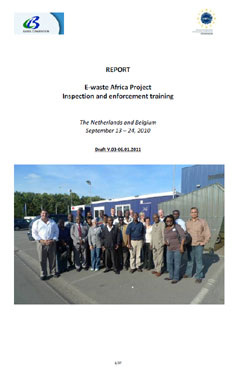 |
| Download |
| English: |
 |
Report: E-waste Africa Project Inspection and enforcement training, The Netherlands and Belgium, September 13 - 24 2010
 As part of the SBC E-waste Africa project, component 4, IMPEL hosted a train-the-trainer event on Ewaste inspection and enforcement. The event took place between 13 and 24 September 2010 in the Netherlands and Belgium. In total 19 officers from competent authorities in Ghana, Benin, Egypt and Nigeria and the Directors of the Basel Convention Regional Centres in Egypt and Senegal and the Basel Convention Coordinating Centre in Nigeria were trained.
The training was created around six modules: A: Knowledge and awareness, B: Legislation, C: Port procedures, D: Communication and Collaboration, E: Inspection Methods and F: Train–the-trainer path. The programme consisted of a combination of theoretical sessions, practical exercises and field trips to the ports of Amsterdam, Rotterdam and Antwerp and e-waste collection and treatment sites.
The final exercise requested the participants to develop the e-waste chain as applicable in their own country and list possible intervention moments and strategies. Furthermore a preliminary discussion took place concerning the national trainings that are foreseen to be organised in 2011 in the participating African countries. Also the development of a toolkit to support the trainings and the establishment of a European – African enforcement network were considered.
Overall the training was regarded as very valuable and well organised and set up. The active involvement and engagement of the participants contributed to the success of the training!
The next steps are to prepare the national training events in 2011, such as identifying focal points and lead organisations in the African countries, proposing a format for the training, agreeing on dates and developing the toolkit and the EU – African enforcement network.
| Download |
| English: |
 |
|
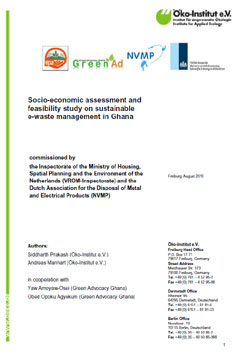 |
| Download |
| English: |
 |
Socio-economic assessment and feasibility study on sustainable e-waste management in Ghana
 Debate on environmental, health and social problems associated with the uncontrolled dumping and inappropriate recycling of e-waste has already reached the mainstream of policy-makers in developed as well as developing countries. However, most of the developing countries have not yet been able to enforce national policies and legislations for managing e-waste. Furthermore, lack of technology and skills, and unexplored business and financing opportunities, coupled with an exponential growth in the use of electric and electronic equipments in the developing countries, have led to severe challenges in terms of managing e-waste in a proper manner. As e-waste entails several toxic and hazardous substances, its improper processing, recycling and disposal leads to severe health hazards, environmental pollution and social problems, not only for the people involved directly in ewaste related activities, but also for the local communities and the society as a whole. At the same time, e-waste is also a source of different types of metals, such as gold, silver, palladium, aluminium and copper, which makes it quite an attractive source of livelihood not only for a large number of poor people in the developing countries, but also for the national and global economy where the demand for metal resources is constantly growing. So far, there is sufficient evidence to prove that in the absence of proper recycling infrastructure, collectively with the use of crude and inefficient recycling techniques in the developing countries, metals present in the e-waste are partly lost from the closed loop recycling management.
| Download |
| English: |
 |
|
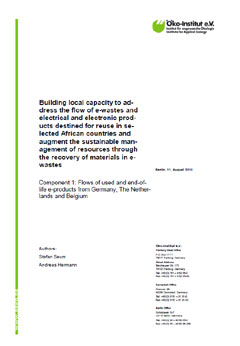 |
| Download |
| English: |
 |
Building local capacity to address the flow of e-wastes and electrical and electronic products destined for reuse in selected African countries and augment the sustainable management of resources through the recovery of materials in ewastes
 This report is part of the first component of the overall project “Building local capacity to address the flow of e-wastes and electrical and electronic products destined for reuse in selected African countries and augment the sustainable management of resources through the recovery of materials in e-wastes”. As a first component, a fact-finding study on flows in used and end-of-life e-products imported into five West-African countries by sea, in particular from two European countries, Belgium and The Netherlands, and two ports, Antwerp and Amsterdam, is carried out.
The aim of the research is to identify the principle pathways of used electronic and electric equipment (EEE) from Europe to West Africa as well as potential leakage points for end-of-life products that are mandatory required under the WEEE directive to undergo sound waste treatment within Europe. The study focuses on sources, destinations and volumes of used EEE exports as well as on the characteristics of the export business. The role of the two ports and regions in focus will be analyzed.
| Download |
| English: |
 |
|
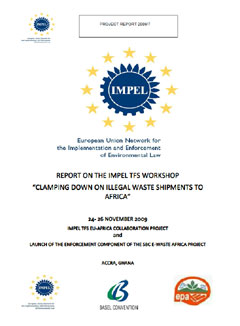 |
| Download |
| English: |
 |
Report on the workshop "Clamping Down on Illegal Waste Shipments to Africa", 24-26 November 2009, Accra, Ghana
This was the first IMPEL workshop held outside of Europe and was jointly organised by IMPEL TFS, the Secretariat Basel Convention, the Basel Convention Regional Centres and the Environmental Protection Agency of Ghana. The aims of the workshop were:
- Establish a network of contacts between European states and African countries, and
- Launch the SBC E-waste Africa project component on enforcement including:
- Carrying out a needs assessment to collect information regarding the current situation with respect to capacity, cooperation, legal powers and enforcement practices in five countries in Africa.
- Developing a training curriculum for African enforcers to detect and prevent illegal shipments of E-wastes.
| Download |
| English: |
 |
|